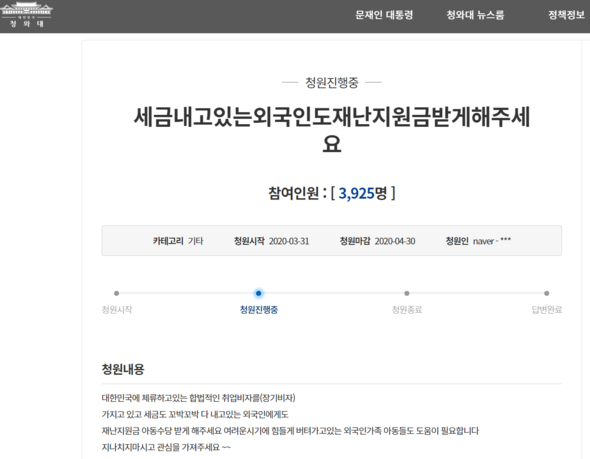hankyoreh
Links to other country sites 다른 나라 사이트 링크
[Correspondent’s column] Defining what makes someone a member of a society

The coronavirus pandemic is casting the dark shadow of recession over the global economy. The South Korean government has promised to provide basic disaster allowances for individuals who are facing economic difficulties.
While that’s welcome news, one aspect of it is disappointing. According to an announcement made on Apr. 16 following a joint meeting of related government agencies, aid will be reserved for South Korean citizens residing in the country. Citizens living overseas and resident foreigners will not be eligible for aid, except for permanent residents and those with a close connection to South Korean citizens, such as “marriage migrants.” While the final decision hasn’t been made, this plan, if implemented, would exclude a significant number of foreigners who are legally in the country from receiving aid.
Since I’m currently a resident of Japan, I’d like to examine the situation there. On Apr. 20, Japan’s Ministry of Internal Affairs and Communications unveiled the specific guidelines for payments of 100,000 yen (US$929) that will be made to all Japanese citizens. These payments, which amount to emergency disaster aid, are available to anyone who’s registered as a resident as of Apr. 27. That means that foreigners, as long as they’re approved for a sojourn of three or more months, are also eligible for the aid.
When Japanese Prime Minister Shinzo Abe announced that the emergency status that had already been declared for seven regions of the country was being extended nationwide on Apr. 16, he also brought up the idea of making cash payments of 100,000 yen to every citizen. Initially there were doubts about whether aid earmarked for “every citizen” would also be given to foreigners living in Japan, but it turned out that foreigners are eligible for the aid, too.
That wasn’t an unusual decision for the Abe administration to make; it was only sticking to precedent. In 2009, in the wake of the global financial crisis, Prime Minister Taro Aso paid 12,000 yen (US$111) to everyone in Japan, including long-term foreign residents (those 18 and below and 65 and above were paid 20,000 yen, or US$186). Foreigners who are legal residents of Japan have already been receiving the children allowance, too.
Compared to other countries around the world, I don’t think that Japan is some kind of unusual case. In Germany, for example, anyone who has received a tax number and is making an income there — even foreign nationals — can immediately receive disaster aid if they’ve taken a financial hit because of the coronavirus. The Portuguese government has also reportedly given all refugees and immigrants temporary citizenship, lasting through the end of June.
I sometimes find myself thinking about how broadly we define the concept of members of a society. When I drop by a convenience store in Tokyo at night, the employees I encounter are much more likely to be foreign than Japanese. The employees who are hard at work preparing affordable meals at franchise restaurants are often foreigners, too. When the borders were blocked to migrant workers because of the COVID-19 outbreak, farmers started sounding the alarm about a shortage of workers.
Shrinking population and societal aging necessitate more liberal immigration policiesGiven the pressing issues of a shrinking population and societal aging, Japanese society cannot be maintained unless the Japanese start allowing foreigners to become members of that society. Such circumstances explain the Japanese government’s decision in 2018 to bring in up to 350,000 more foreign workers over five years, even though the conservative Abe administration insisted that this isn’t a pro-immigration policy.
I don’t think that Japan’s situation is fundamentally different from South Korea’s. Just because a given individual doesn’t have South Korean citizenship doesn’t mean they’re not a member of South Korean society. That’s true not only from a humanitarian perspective, but also in practical and economic terms.
I took a look at the petition on the Blue House website that asks for basic disaster allowances to be paid to foreigners, too. Foreigners who faithfully pay their taxes and who are in the country on a legal work visa should be given disaster relief as well as the children allowance, the petition says. In my opinion, that’s the least they could ask for. I added my signature to the petition with a heavy heart.

By Cho Ki-weon, Tokyo correspondent
Please direct comments or questions to [english@hani.co.kr]

Editorial・opinion
![[Column] Season 2 of special prosecutor probe may be coming to Korea soon [Column] Season 2 of special prosecutor probe may be coming to Korea soon](https://flexible.img.hani.co.kr/flexible/normal/500/300/imgdb/original/2024/0426/3317141030699447.jpg) [Column] Season 2 of special prosecutor probe may be coming to Korea soon
[Column] Season 2 of special prosecutor probe may be coming to Korea soon![[Column] Park Geun-hye déjà vu in Yoon Suk-yeol [Column] Park Geun-hye déjà vu in Yoon Suk-yeol](https://flexible.img.hani.co.kr/flexible/normal/500/300/imgdb/original/2024/0424/651713945113788.jpg) [Column] Park Geun-hye déjà vu in Yoon Suk-yeol
[Column] Park Geun-hye déjà vu in Yoon Suk-yeol- [Editorial] New weight of N. Korea’s nuclear threats makes dialogue all the more urgent
- [Guest essay] The real reason Korea’s new right wants to dub Rhee a founding father
- [Column] ‘Choson’: Is it time we start referring to N. Korea in its own terms?
- [Editorial] Japan’s rewriting of history with Korea has gone too far
- [Column] The president’s questionable capacity for dialogue
- [Column] Are chaebol firms just pizza pies for families to divvy up as they please?
- [Column] Has Korea, too, crossed the Rubicon on China?
- [Correspondent’s column] In Japan’s alliance with US, echoes of its past alliances with UK
Most viewed articles
- 1AI is catching up with humans at a ‘shocking’ rate
- 2‘We must say no’: Seoul defense chief on Korean, USFK involvement in hypothetical Taiwan crisis
- 3[Column] Season 2 of special prosecutor probe may be coming to Korea soon
- 4Is Japan about to snatch control of Line messenger from Korea’s Naver?
- 5Korea sees more deaths than births for 52nd consecutive month in February
- 6Amnesty notes ‘erosion’ of freedom of expression in Korea in annual human rights report
- 7[Editorial] Korea’s surprise Q1 growth requires objective assessment, not blind fanfare
- 8Is N. Korea threatening to test nukes in response to possible new US-led sanctions body?
- 9Foreign workers live behind daunting language barrier
- 10Park administration’s distorted history textbooks made public